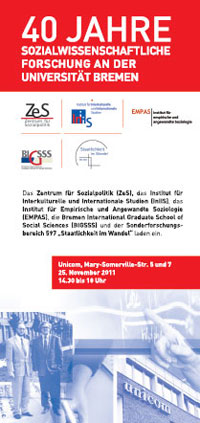 40th Anniversary of social science research at the University of Bremen
40th Anniversary of social science research at the University of BremenSocial sciences already played a key, although not always uncontroversial, role in research and teaching during the founding and first years of the University of Bremen. A breakthrough was reflected in 1988 by the Collaborative Research Centre 186 (Status Passages and the Life Course) through the merger and rising profiles of various social science research fields - it became the first Collaborative Research Centre at the University of Bremen to ever be funded by the German Research Association (DFG).
In the years thereafter, a cornerstone was laid for strengthening the social sciences toward excellence. As a result the initiative shown by social science research facilities such as the Institute for Intercultural and International Studies (InIIS), the Institute for Empirical and Applied Sociology (EMPAS), and the Centre for Social Policy Research (ZeS), the founding of the Graduate School of Social Sciences (GSSS), funded by the Volkswagen Foundation, and a successful application by the Collaborative Research Centre 597 (Transformation of State) were possible. Now known as the Bremen International Graduate School of Social Sciences (BIGSSS), cooperation with Jacobs University Bremen is supported through funds from the Excellence Initiative by the Federal Government and Federal States. In 2011, BIGSSS submitted a renewal application.
After four decades, social science research has developed into one of the most prominent research areas at the University of Bremen. There are thus plenty of reasons to celebrate with all of those who have made this development possible.











